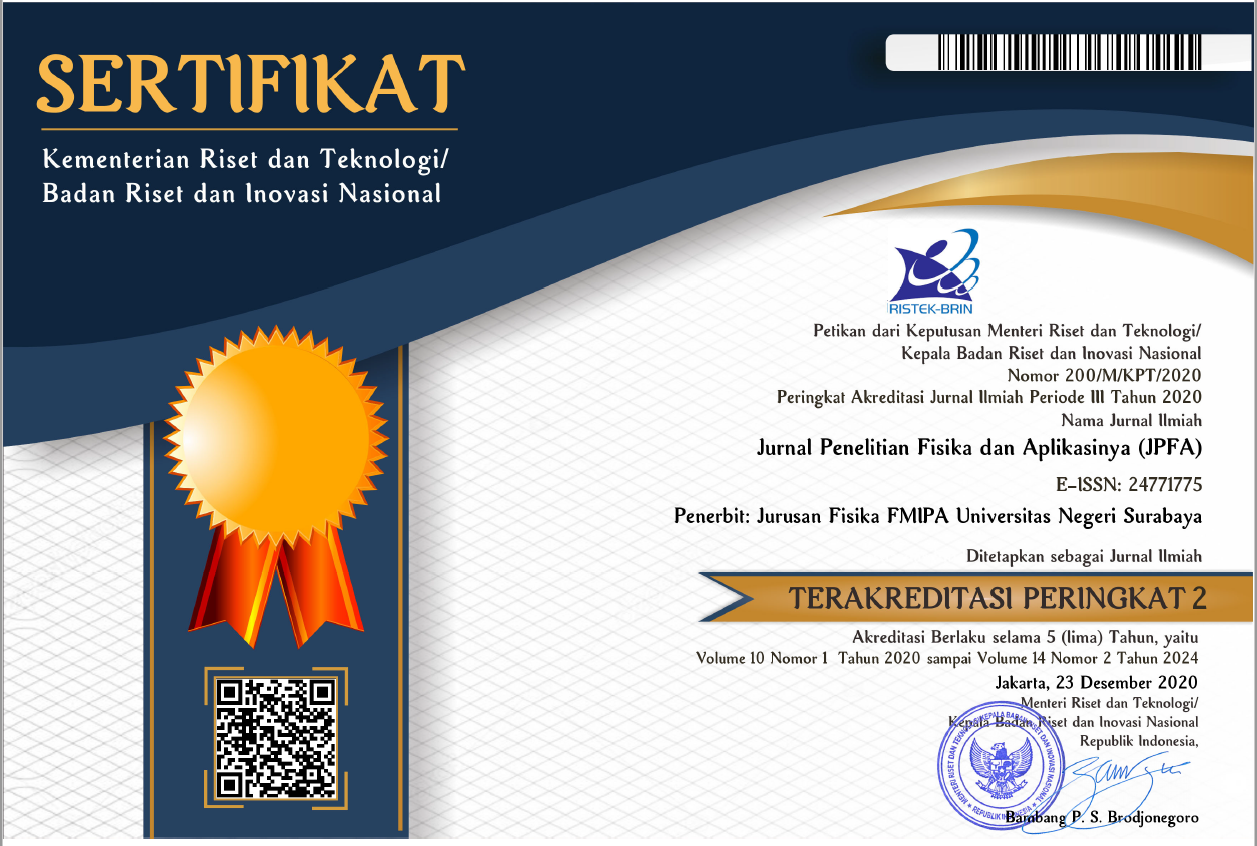PENINGKATAN PRESTASI BELAJAR FISIKA ZAT PADAT MAHASISWA NON-REGULAR MELALUI PEMBELAJARAN STAD DENGAN STRATEGI SELF-EXPLANATION
DOI:
https://doi.org/10.26740/jpfa.v4n1.p23-35Keywords:
STAD, Self-Explanation, prestasi belajar, Fisika Zat PadatAbstract
Penelitian ini bertujuan untuk meningkatkan prestasi belajar matakuliah Fisika Zat Padat mahasiswa non-regular melalui pembelajaran model STAD dengan strategi Self-Explanation. Penelitian ini menggunakan disain kuasi eksperimen rancangan nonequivalent control group design. Hasil penelitian menunjukkan bahwa pembelajaran model STAD dengan strategi Self-Explanation mampu meningkatkan prestasi belajar mahasiswa, yang ditandai oleh gain score ternormalisasi rata-rata kelas eksperimen berturut-turut untuk tes I, II, dan final sebesar 0,567 (kategori medium), 0,783 (kategori tinggi), dan 0,465 (kategori medium) lebih tinggi daripada kelas kontrol sebesar 0,366 (kategori medium), 0,391 (kategori medium), dan 0,340 (kategori medium). Di samping itu, mahasiswa kelas eksperimen memberikan respon positip terhadap proses pembelajaran lebih tinggi daripada kelas kontrol.
References
Chi, M.T.H., VanLehn, K.A. 1991. œThe Content of Physics Self-Explanations. THE JOURNAL OF THE LEARNING SCIENCES l (1) 69-105
Gall, M.D., Gall, J.P., and Borg, W.R. 2003. Educational Research: An Introduction. Boston: Allyn and Bacon
Jackson, J., Dukerich, L., and Hestenes, D. 2008. œModeling Instruction: An Effective Model for Science Education. Science Educator. Vol. 17. No. 1. Spring 2008 pp. 10-17
Hake, R. 1998. œInteractive-engagement vs traditional methods: a six-thousand-student survey of mechamics test data for introductory physics courses. Am. J, Phys. 64-74.
Lamba, H.A. 2006. œPengaruh Pembelajaran Kooperatif Model STAD dan Gaya Kognitif Terhadap Hasil Belajar Fisika Siswa SMA. Jurnal Ilmu Pendidikan Jilid 13, Nomor 2, Juni 2006.
Parlan. 2003. Penggunaan Model Pembelajaran Kooperatif (Cooperative Learning) Tipe STAD untuk Meningkatkan Kualitas Proses dan Hasil Belajar Kimia Organik III Mahasiswa Jurusan Kimia FMIPA Universitas Negeri Malang. Laporan Penelitian tidak diterbitkan. Malang: Lembaga Penelitian Universitas Negeri Malang.
Parlan. 2006. Penggunaan Model Pembelajaran Kooperatif STAD untuk Meningkatkan Kualitas Proses dan Hasil Belajar Kimia Kelas X SMAN 9 Malang. Laporan Penelitian tidak diterbitkan. Malang: Lembaga Penelitian Universitas Negeri Malang.
Parno. 2009a. Pengaruh STAD terhadap Peningkatan Kemampuan Mahasiswa Menguasai Materi Fisika Sekolah. Jurnal Pendidikan Matematika dan Sains (JPMS) FMIPA Universitas Negeri Yogyakarta. Volume 14, Nomor 2, November 2009.
Parno. 2009b. œPeningkatan Gain Score Pretes-Postes Prestasi Belajar Fisika Zat Padat Mahasiswa Melalui Model STAD dalam Kegiatan Lesson Study. Makalah disajikan dalam Seminar Nasional ke 2 Lesson Study: Perkem-bangan Innovási Pembelajaran melalui Lesson Study dan Dampaknya terhadap Peningkatan Mutu Pendidikan di Indonesia di FMIPA Universitas Negeri Malang pada 17 Oktober 2009.
Parno. 2009c. œPengaruh Pembelajaran Menggunakan Peta Konsep dan Model Pemecahan Masalah terhadap Peningkatan Prestasi Belajar Fisika Zat Padat Mahasiswa. Jurnal Penelitian Pendidikan MATEMATIKA DAN SAINS. FMIPA UNESA. Vol. 16, No. 2, Desember 2009
Schraw, G. and Dennison, R.S. 1994. œAssessing Metacognitive Awareness. Contemporary Educational Psychology, 19, 460-475
Slavin, R.E. 1995. Cooperative Learning: Theory, Research, and Practice 2nd ed. Boston: A Simon & Schuster Company
Slavin, R.E. 2006. Educational Psychology: Theory and Practice (8-th Edition). Boston: Pearson.
Tajika, H., Nakatsu, N., Nozaki, H., Neumann, E., Maruno, S. 2007. œEffects of Self-Explanation as A Metacognitive Strategy for Solving Mathematical Word Problems. Japanese Psychological Research (2007), Volume 49, No. 3, 222233
Ubaya. 2006. Panduan Pelaksanaan kegiatan dan Sistem Evaluasi HPKP SMA 2006.
UM. 2013. Katalog FMIPA UM: Jurusan Fisika (Edisi 2013). Malang: FMIPA Universitas Negeri Malang.
Wenning, C.J. 2003. œChange principles for departmentally-based physics teacher education programs. JOURNAL OF PHYSICS TEACHER EDUCATION ONLINE Vol. 2, No. 1 September 2003 pp. 7-12
Woolfolk, A, Hughes, M, and Walkup, V. 2008. Psychology in Education. New York: Pearson Longman
Downloads
Published
How to Cite
Issue
Section
License
Author(s) who wish to publish with this journal should agree to the following terms:
- Author(s) retain copyright and grant the journal right of first publication with the work simultaneously licensed under a Creative Commons Attribution-Non Commercial 4.0 License (CC BY-NC) that allows others to share the work with an acknowledgement of the work's authorship and initial publication in this journal for noncommercial purposes.
- Author(s) are able to enter into separate, additional contractual arrangements for the non-exclusive distribution of the journal's published version of the work (e.g., post it to an institutional repository or publish it in a book), with an acknowledgement of its initial publication in this journal.
The publisher publish and distribute the Article with the copyright notice to the JPFA with the article license CC-BY-NC 4.0.
 Abstract views: 762
,
Abstract views: 762
, PDF Downloads: 548
PDF Downloads: 548








